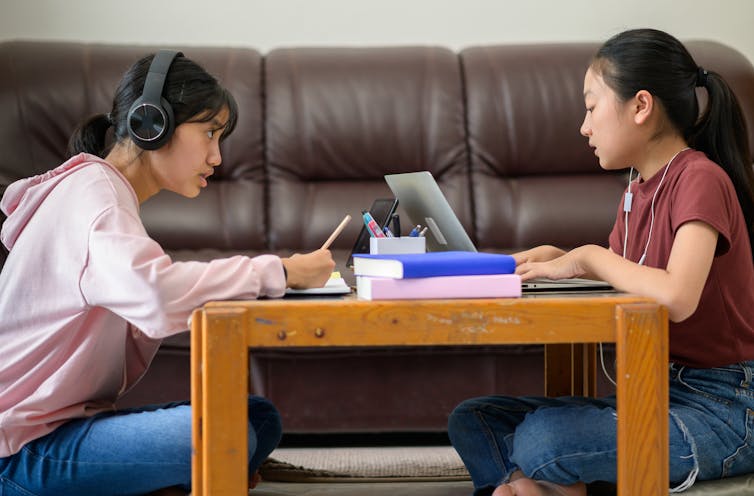[ad_1]
When COVID shuttered faculties around the globe in 2020, the best way academics delivered their classes and college students did their classwork modified over night time. As one Boston-based secondary college scholar wrote in a latest case research, “bedrooms was college school rooms, residing rooms was science laboratories and backyards was exercise gyms.”
Two years on, this shift to distant and, subsequently, hybrid studying has offered many challenges. It has brought about stress and confusion for educating workers and pupils alike. But it surely has introduced stunning advantages too.
A latest report drawing collectively the outcomes of 81 research of secondary faculties from 38 international locations has highlighted how complementary these digital studying strategies might be to conventional strategies of education. Pupils have discovered working at their very own tempo, and with out the social pressures of the classroom, useful. Whilst we face the prospect of continued disruption in 2022, these are causes to be hopeful.

Gorodenkoff | Shutterstock
Digital expertise
Through the pandemic, many faculties needed to make larger use of studying administration methods and apps, with a purpose to enhance communication between college and residential.
It may appear apparent, however having to work remotely has inspired academics and college students to revisit and improve their digital expertise. This has stimulated innovation and artistic pondering, and prompted college students to develop expertise in utilizing a number of digital instruments and assets successfully for studying, similar to these reported in a US research.
Many college students have confirmed an elevated skill to check and to problem-solve independently. Lecturers in Hong Kong reported that college students had developed problem-solving strategies that their academics hadn’t taught them.
Of the two,824 secondary college pupils who responded to a survey in Slovakia, in the meantime, most stated they’d discovered studying at their very own tempo to be invaluable. Being able to re-watch tutorial movies helped them achieve deeper understanding of their topics and preserve a connection to their academics.
In England, Sweden and the US, a number of college students who, pre-pandemic, have been reluctant to participate in classes or go to class in any respect, reported changing into extra concerned and engaged with their schoolwork throughout lockdown, as a result of they felt much less social strain. Instrumental music college students in Australia additionally confirmed enchancment of their social expertise, together with communication, negotiation and energetic listening.
College students in Austria, the US and Portugal additionally benefited from interacting with their friends – distant studying gave them new strategies of collaboration, together with growing interactive ePortfolios, utilizing dialogue boards to share concepts and conduct college work with friends, in addition to collaborating on genuine duties similar to co-creating digital posters and movies, and distributing them by way of social media. One US research reported that utilizing the chat perform in Google Meet throughout reside classes, mixed with enhancing work and writing feedback in Google Docs, was notably useful for college kids to collaborate and keep in contact with their friends.

PK Studio | Shutterstock
Communication and evaluation
For some international locations, shifting to on-line evaluation, after they had previously adopted a closely standardised test-based tradition, was fairly troublesome, as this now demanded different evaluation strategies that might additionally safe reliable outcomes. Whereas some international locations forbade evaluation throughout lockdown, our assessment uncovered the alternative too: no fewer than 21 on-line evaluation methods have been recognized. Thus, having to rely closely on know-how throughout lockdown did open new and artistic modes of evaluation design and supply.
The 2 commonest methods used have been formative evaluation and on-line quizzes – recognized in 16% of the research we checked out. Whereas formative evaluation has beforehand been discovered to enhance scholar studying, the 2 methods have been employed for various causes.
Formative evaluation, usually performed in actual time, was supported by video-conferencing instruments. It enabled academics to see and listen to their college students, which supported the evaluation of literature speak and language evaluation, together with position performs, on-line debates and drama performances. Lecturers additionally reported that this real-time interplay supported a way of social presence, which is necessary for scholar wellbeing.
On-line quizzes, in the meantime, allowed college students to test their understanding at their very own tempo, which helped, as reported in an Indonesian research of 12 months 10 college students, to stave off bordeom. Being auto-corrected, quizzes additionally helped to lower academics’ work load. Lastly, this sort of digital evaluation was additionally simply shared between academics, which supported equality and re-usability.
Guardian engagement
Some mother and father reported enhanced digital expertise on account of the pandemic. However the primary takeaway has been mother and father’ elevated impetus to interact extra of their youngsters’s studying.

Monkey Enterprise Photographs | Shutterstock
Analysis in Nigeria discovered that giving mother and father larger entry to what their youngsters have been studying helped to enhance the scholars’ dedication to studying on-line. In Vietnam, having mother and father on board on this manner was discovered to make the entire course of simpler.
Having the ability to entry conferences with academics nearly has additionally lowered social limitations for some households. A survey performed by ParentPing in December 2020, discovered that each mother and father and academics wished to maintain dad or mum evenings digital, or no less than be given the choice to take action.
College, extra broadly, can and will develop into extra versatile. Guaranteeing that it does will encourage inclusion and accessibility. It would help lifelong studying.
[ad_2]

